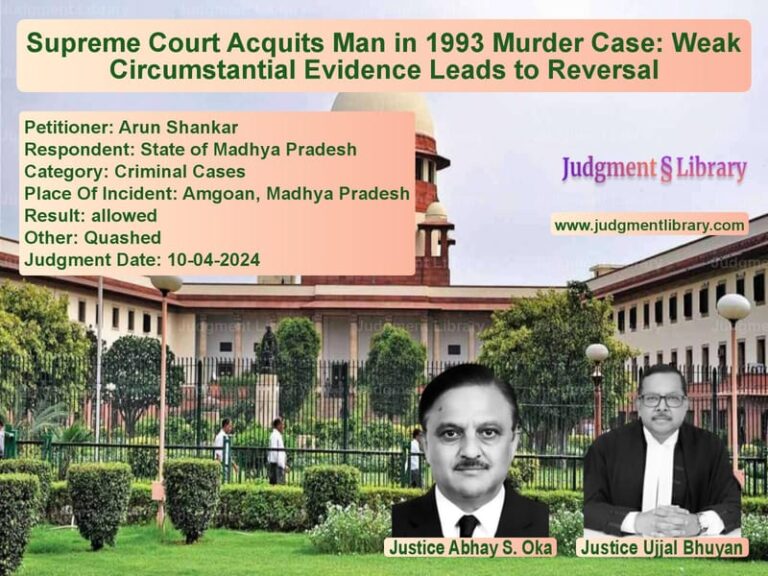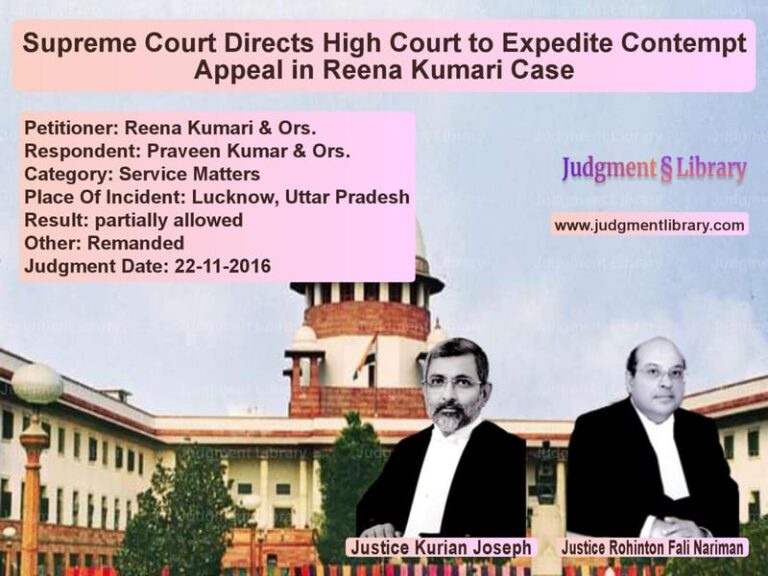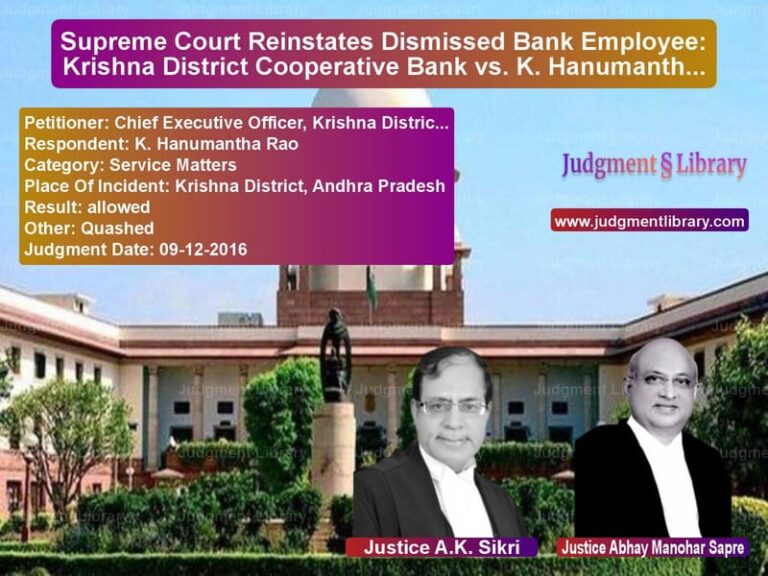Labour Court’s Power in Employee Dismissal Cases: Supreme Court Clarifies Jurisdiction
The Supreme Court of India, in the case of John D’Souza vs. Karnataka State Road Transport Corporation, has provided clarity on the scope of jurisdiction exercised by Labour Courts under Section 33(2)(b) of the Industrial Disputes Act, 1947. The case revolved around the dismissal of an employee, the procedural fairness of domestic inquiries, and whether Labour Courts could allow additional evidence when deciding employer applications under this provision.
The judgment, delivered by Justices Surya Kant and Sanjay Kishan Kaul, emphasized that the Labour Court’s role is limited to determining procedural fairness in disciplinary actions and that it cannot conduct a full-fledged trial unless serious procedural lapses exist in the domestic inquiry.
Case Background
John D’Souza, the appellant, worked as a bus conductor for the Karnataka State Road Transport Corporation (KSRTC). He was also an active trade union leader, serving as the General Secretary of the KSRTC and BMTC United Employees Union. The conflict arose when he remained absent from duty from August 18, 2005, without prior approval. His employer, KSRTC, initiated disciplinary proceedings, eventually leading to his dismissal from service on October 11, 2010.
His past service record showed 30 instances of default, including previous dismissals that were later set aside or withdrawn. Given that an industrial dispute involving him was already pending before the Labour Court, KSRTC applied under Section 33(2)(b) of the Industrial Disputes Act, seeking approval for his dismissal. The Labour Court ruled in favor of the appellant, leading to further legal challenges.
Legal Questions Before the Court
- What is the scope of the Labour Court’s power under Section 33(2)(b) of the Industrial Disputes Act?
- Can a Labour Court permit additional evidence beyond what was presented in the domestic inquiry?
- What constitutes a “prima facie case” for dismissal, and to what extent can a Labour Court assess the employer’s decision?
Labour Court Proceedings and Findings
The Labour Court initially ruled in favor of the workman, rejecting KSRTC’s application under Section 33(2)(b). The Labour Court found that the workman had applied for leave but was denied the opportunity to resume his duties. Additionally, the court ruled that KSRTC’s decision to dismiss him was not entirely justified.
The High Court, however, overturned this decision, stating that the Labour Court had overstepped its jurisdiction by allowing new evidence beyond the domestic inquiry. It ruled that the Labour Court was only required to check whether the domestic inquiry was conducted fairly and in accordance with the principles of natural justice, rather than conducting a fresh trial.
Supreme Court’s Key Observations
The Supreme Court examined several precedents and reaffirmed that the jurisdiction of a Labour Court under Section 33(2)(b) is restricted. The Court noted:
“A prima facie case does not mean a case proved to the hilt, but a case which can be said to be established if the evidence, which is led in support of the same, were believed.”
The Court further clarified that the Labour Court cannot substitute its own judgment for that of the employer unless the inquiry is found to be fundamentally flawed. If the domestic inquiry meets procedural standards, the Labour Court must grant approval for the employer’s action.
Precedents Relied Upon
The Supreme Court cited several landmark cases that had previously defined the jurisdiction of Labour Courts under Section 33(2)(b):
- Martin Burn Ltd. v. R.N. Banerjee (1958) – Establishing that the Labour Court’s role is to assess prima facie evidence and not to substitute its own judgment.
- Punjab National Bank v. Workmen (1960) – Clarifying that permission under Section 33 does not validate the dismissal but merely removes the procedural bar.
- Mysore Steel Works Pvt. Ltd. v. Jitendra Chandra Kar (1971) – Reinforcing that the Labour Court must examine procedural compliance rather than the proportionality of punishment.
- Cholan Roadways Ltd. v. G. Thirugnanasambandam (2005) – Reiterating that the Labour Court must assess whether the domestic inquiry was fair and not conduct a retrial.
Final Judgment and Directions
The Supreme Court set aside the High Court’s ruling and remanded the case back to the Labour Court, instructing it to review the employer’s application strictly within the scope of Section 33(2)(b). The Court also recommended that the parties attempt mediation through the High Court of Karnataka’s Mediation Centre.
Given that the appellant had already attained the age of superannuation in 2010, the Court suggested a settlement regarding back wages. The employer had earlier offered 50% back wages, while the appellant had demanded 75%. The Court urged both parties to adopt a balanced approach to avoid prolonged litigation.
Key Takeaways from the Judgment
- The Labour Court’s role under Section 33(2)(b) is limited to checking procedural fairness in dismissal cases.
- Labour Courts cannot permit additional evidence unless the domestic inquiry is found to be defective.
- Even if approval is granted under Section 33(2)(b), the workman retains the right to challenge the dismissal through a separate industrial dispute.
- Mediation remains a viable option for resolving industrial disputes amicably.
Conclusion
This judgment is a crucial development in Indian labour law, reaffirming the limited scope of Labour Courts under Section 33(2)(b). It ensures that while workmen are protected from unfair treatment, employers retain the ability to enforce discipline within reasonable legal boundaries. By clarifying the procedural limitations, the ruling helps strike a balance between workers’ rights and management prerogatives under the Industrial Disputes Act.
Petitioner Name: John D’Souza.Respondent Name: Karnataka State Road Transport Corporation.Judgment By: Justice Surya Kant, Justice Sanjay Kishan Kaul.Place Of Incident: Karnataka.Judgment Date: 16-10-2019.
Don’t miss out on the full details! Download the complete judgment in PDF format below and gain valuable insights instantly!
Download Judgment: John D’Souza vs Karnataka State Road Supreme Court of India Judgment Dated 16-10-2019.pdf
Direct Downlaod Judgment: Direct downlaod this Judgment
See all petitions in Employment Disputes
See all petitions in Disciplinary Proceedings
See all petitions in Termination Cases
See all petitions in Judgment by Surya Kant
See all petitions in Judgment by Sanjay Kishan Kaul
See all petitions in partially allowed
See all petitions in Remanded
See all petitions in supreme court of India judgments October 2019
See all petitions in 2019 judgments
See all posts in Service Matters Category
See all allowed petitions in Service Matters Category
See all Dismissed petitions in Service Matters Category
See all partially allowed petitions in Service Matters Category







